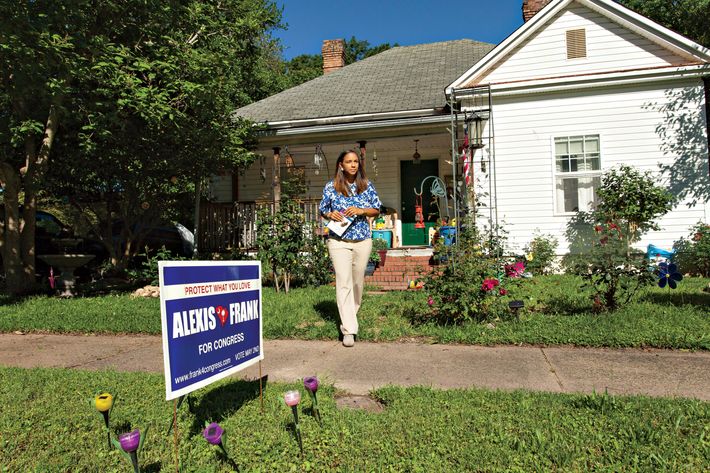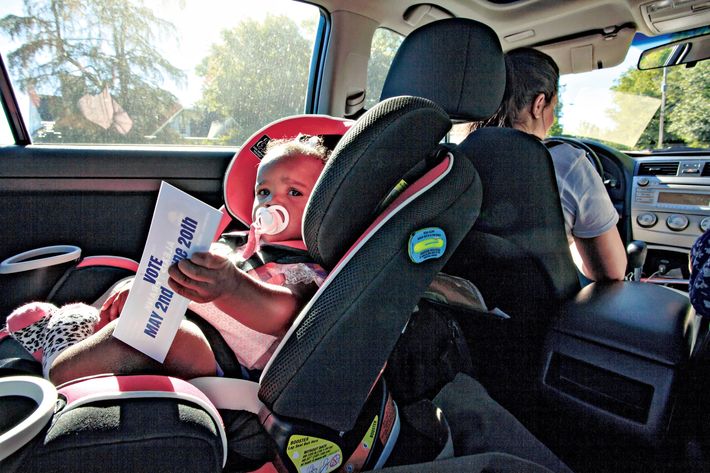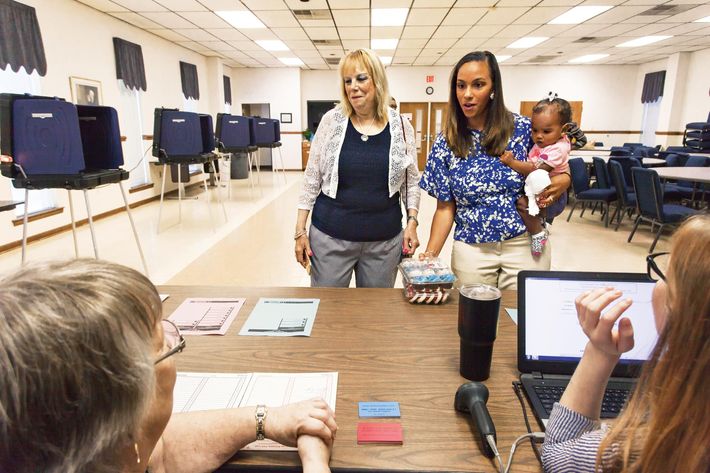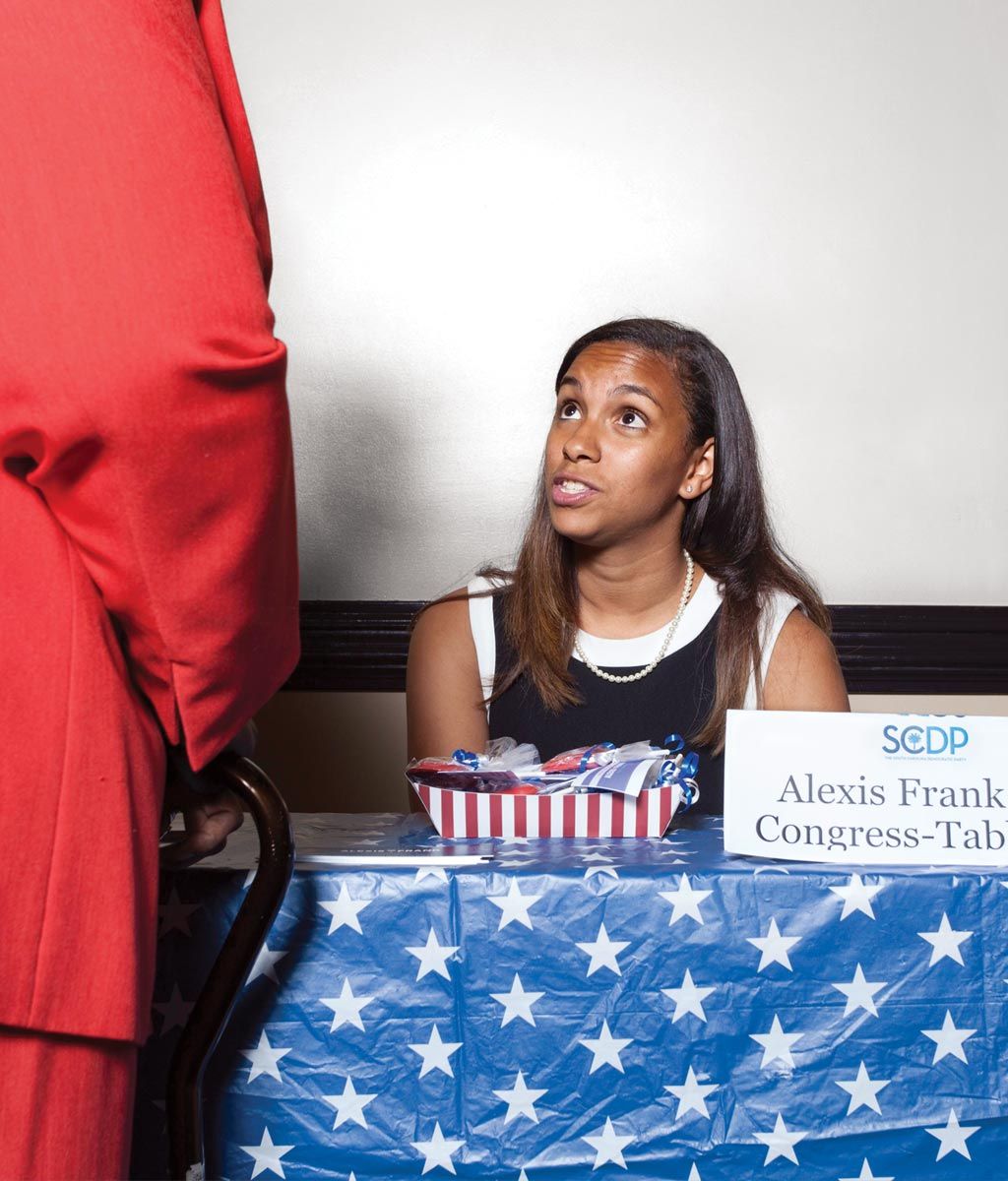The 2016 presidential election unfolded for Alexis Frank as a kind of awakening. She was 26 years old, a mother of two, and the biracial daughter of a single mom, living on base at Camp Lejeune in North Carolina with her husband, an active-duty Marine, about 250 miles away from her home in South Carolina. Before the campaign, she had never considered herself particularly political. Now, though, she was posting furiously to Facebook: “A man who fought so hard to find a way not to fight for his country, has the audacity to insult our most precious POWs. If you are a vet and support this scum, I don’t get you. This is despicable …”
By Election Day, she saw sending Hillary Clinton to the White House as a moral imperative. That night, she fell asleep watching the returns. She woke up around 2 a.m. to feed her infant daughter. Soon after, Clinton was calling Trump to concede. “I cried,” Frank says. “We had elected a man who had pushed all of these hateful platforms.” In January, she went to the Women’s March on Washington, putting a banner on her daughter’s carrier that said MOMMY MARCHES FOR ME. “The greatest thing I have received from this election is the realization that I care about this country way more than I ever thought I did,” she wrote on Facebook a few days later, “and it might be high time that I started working towards putting that care into action.” In late February, she saw a YouTube video that gave her an idea of what that action might be. The video had been made by a 34-year-old freelance photographer named Frankie Norstad, who’d started uploading videos breaking down how progressives could fight Trump. In the one Frank saw, Norstad gave an overview of special elections happening in the first half of 2017.
“Let’s talk South Carolina’s District 5,” she says in the video. The district encompasses the north-central part of the state. Near the top is Rock Hill, a quaint college town south of Charlotte, North Carolina. From there, it stretches down to the Midlands, stopping just outside Columbia. The seat had been held by a Democrat for nearly 30 years, until 2010, when the district elected Mick Mulvaney, who made a name for himself as a founding member of the right-wing House Freedom Caucus. After winning the presidency, Trump picked Mulvaney to be the director of the Office of Management and Budget. That meant his seat was now open. At the time, the only candidates running to fill it were Republicans, which made sense, since a Republican would almost certainly take the seat. There needed to be at least one Democrat in contention, Norstad argued. “Find me a person of color, an activist, a pastor, an educator, a woman.”
Frank emailed Norstad that day. Less than two weeks later, she was driving down to Columbia with her mother to file the paperwork to become a candidate for South Carolina’s fifth district. Which was how Frank found herself, in late April, at the annual state Democratic Party dinner in Columbia. Around her, the local Establishment waited to hear DNC chair Tom Perez speak, while Frank sat at a table with her mother. If she won, she would become the youngest woman ever elected to Congress. “We’ll see,” she said, picking at a piece of lettuce from her salad. “I can’t go back to being a stay-at-home mom, I know that much.”

“We came back from the Women’s March just like every other person in the freaking world — empowered, like we’ve got to do something,” says Brittany Kelly. It’s Saturday night in Rock Hill, and she, Christine Chavis, and Emma Adelman, two other members of Team Frank, bring glasses of wine to a table by the pool in Kelly’s backyard. It’s the day after the state dinner and three days before the primary — two other Democrats were also running — and Kelly’s two-story home has become Frank’s campaign headquarters. In the dining room, sheets of paper bearing the names of each county in the district paper the walls; boxes of T-shirts and campaign literature crowd the corners of the room. Chavis and Adelman have spent the evening handing out flyers at a music festival while Frank was knocking on doors. (“You’re mighty small to be doing a big job,” one man told her.)
Kelly, a 33-year-old interior designer, had met Frank a week after the fateful YouTube video. After Frank contacted her, Norstad had flown out from California to try to persuade Frank to run and taken her to Kelly’s house to meet some members of Rock Hill Rising, a mostly female local progressive group Kelly and some friends had started after the Women’s March. “I don’t know what Alexis was on the day she reached out to [Norstad],” Kelly says, laughing. “But I was like, ‘Get it girl!’ That’s pretty ballsy.” Kelly was intrigued by what Frank could represent — a young woman of color who’d declared herself part of the resistance. “We were thinking, This is what we need. My God, she’s like the perfect person!” The day they met, Archie Parnell, a 66-year-old first-time candidate who had worked for Goldman Sachs and ExxonMobil, had announced plans to enter the Democratic primary. “We were like, You’ve got to be kidding. Another old, rich, white man?,” Kelly says. The women had encouraged Frank to go for it. “They were like, ‘You have to run!’ I didn’t realize — I think they were drunk that day,” Frank says later, only half-joking.
When Frank started her run, she was mostly on her own. Norstad had returned to California — she came back to help, but she couldn’t be away full time. Kelly was there, but she had work and a family, too. Nationally, Frank isn’t alone; since the election, more than 13,000 women have contacted EMILY’S List, the organization that works to recruit Democratic women for elected positions, about running for office, and the Democratic Party helps connect would-be candidates with organizations providing training. But Frank didn’t have a chance to attend any before jumping into the race.
She settled on a campaign slogan — “Protect what you love” — and decided to focus on education and jobs. Chavis, a Rock Hill–based IT manager, was Frank’s first real volunteer. She threw her support behind her after watching her speak at a progressive meet-up. Those early meet-ups helped Frank win over the women who would become her core base. Her first was a Rock Hill Rising meet and greet at a French bakery. Frank had been told she would be given the floor to introduce herself and her candidacy. She left her house that day not sure what she wanted to say. “I got in the car and I said a few prayers,” she says. She winged it, and though she needed some polish, it went well enough. “It gave me that first sense of security, of You can do this.”
“She got up, and she was good,” says Chavis, recalling the first time she saw her speak. “The crowd responded to her. But the thing that I remember is that she had her freaking notes on her hand and she’d look and be like, ‘Yes’ — she’d check her hand.”
“Which was cute at first,” Kelly says. “But then …” Kelly decided to be her unofficial speech-and-debate coach. Sometimes when Frank was speaking publicly, “she’d tell a story between her and herself. And I was like, ‘You can’t do that, ixnay that!’ It’s an immaturity thing that comes out.”

At one meeting with liberal women two weeks into her campaign, members of the group wanted to know what congressperson she most wanted to emulate; what bill she’d pass tomorrow if she had the chance. She didn’t have answers. “I did horribly,” Frank says. She started studying Congress, looking at bills working their way through committees, thinking in terms of a platform. It wasn’t always enough. When she tried to explain her position on college affordability at a Democratic Party local chapter meeting, someone came up to her after and gently told her that she wasn’t being specific enough. She took a break from canvassing for a day to try to figure out a more detailed plan. She also realized she needed help. Her mother remained her most trusted adviser as well as her handler, secretary, and child-care worker, but she didn’t have experience in politics. “I searched so hard for a campaign manager,” Frank says. “No one could do it, or they were talking about money I didn’t have.”
Meanwhile, a third candidate, Les Murphy, a veteran, had entered the race. And Parnell, who eventually raised over $140,000 (to add to the $100,000 he donated himself), recruited a seasoned pollster who had worked with the Obama campaign and secured endorsements from nearly every former elected Democrat in the state.
But Frank was starting to get noticed online. She got a post up on the private Facebook group Pantsuit Nation; donations began pouring in. “We started to realize, Holy shit, we’re starting to get somewhere,” Kelly says. “And we’re just a bunch of moms who have no frickin’ clue what we’re doing!” The campaign raised over $40,000. Frank was able to recruit consultants who were willing to work cheaply, including Adelman and Anne Teicher, from North Carolina. Adelman tried to explain what brought the team together: “You know how we talk about Sheryl Sandberg and leaning in? She is fully leaning in to being a congresswoman at a pace that is honestly unprecedented.”

“Are you for a woman’s right to choose?” Frank asks. “Yes, duh. Yes!” It’s May Day, the day before the primary, and the candidate is reading questions posed to her from an “Ask Me Anything” forum on Reddit. She’s sitting at a dining-room table with her campaign team in Kelly’s house. Everyone is hunched over laptops. Frank’s 9-month-old daughter, Aliza, sits on the table in a yellow jumper, chewing on a campaign mailer.
“You’re running all of the answers by me before posting them, right?” Frank asks Adelman, who promises she will. While Frank works on one answer, Adelman delegates other questions to the staffers, who draft responses. Most are standard political fare: Do you support single-payer health care? Will you work to make sure that women start getting equal pay? Then the comments turn critical. Someone writes about a Facebook video Frank posted that showed her jumping on a trampoline with her kids. “It really showed immaturity.” Another asks, “Being a young mother of two with a husband away in active military service, how much time do you realistically have to campaign (and serve in Congress, should you get elected)?” Another says, “Hmmm, okay … I’m a single mom and work a full-time job, so I guess you may not really know what that is like … working a job and raising kids, that is.” It pisses the women off. “It isn’t just about race or gender, it’s about age,” says Teicher. She has blonde hair and blue eyes; a stack of Buddha bracelets and a tattoo of a strawberry plant covers her arms. “Do you think anyone questions Archie’s experience?” She gets up and walks into the living room, tucking her legs under her as she curls up in an armchair.
“I didn’t cry until her concession speech,” Teicher says. She’s talking about Hillary Clinton. Her loss comes up a lot among these women. “That’s when I just lost it.” She is choking up, talking about how good it felt when Obama was elected, to know that black children would grow up in a country that had had a black president. “I wanted to do that for little girls, so — ” She lets out a shaky sigh. “I’m still in mourning. I’m still hurting. I didn’t want another white male.”
The next day, Election Day, Frank is up early, delivering baked goods to the volunteers working at her polling precinct. She wasn’t able to hire a pollster, so no one on her campaign has any idea how their candidate will do, whether the Pantsuit Nation money, or the canvassing, or Reddit forum has made any difference. Publicly, she is still upbeat, but privately, the vulnerability creeps in. “Somebody asked if I’d be heartbroken if I lost. I don’t say ‘heartbroken,’ ” she says one evening, after a long day of canvassing. “The more I’ve gotten into it, the more I want to win … the more I’m afraid.”
That night, the campaign volunteers congregate in a banquet room behind what used to be the McCrory’s lunch counter, where a group of black students staged a historic sit-in in 1961. Frank, in a navy-and-red-striped dress she borrowed from Teicher, is mingling with friends and family when the returns start coming in, broadcast on projector screens in front of the room. The numbers don’t look good: Parnell opens up an immediate lead. As the night stretches on, it only widens. Frank huddles with her volunteers. Teicher looks stricken. “I’m still optimistic,” Adelman says. “It’s not over yet.”
“I’m trying to stay optimistic,” Kelly says. “But — ” she emits a cheerful laugh. “No matter how, I don’t see how we win.”
By 9 p.m., it’s over. Frank: 4,030 votes, Parnell: 13,333. She lost to the better-financed, better-connected, more obvious political candidate — who will now face a white male Republican opponent in the general election in June. In an Irish pub across the street, a cheer explodes from the top floor. Parnell is delivering his victory speech. A few minutes later, Frank steps outside and calls him to concede.
Back inside, she addresses her supporters. “I think it’s clear that tonight didn’t really go the way we wanted it to,” she says. Her baby lets out a cry from her mother’s lap. The music is off, and the 22 people left in the room pull up chairs to watch. “I think everyone knows why I decided to run for this spot, if not for any other reason than — ” She pauses, then asks, “Why am I crying?” as she tries to stanch the flow of tears. “To prove that you’re never too young. Whatever reason you have is the right reason. I ran for my children, for my daughter. They deserve more.” Her voice breaks, and someone from the group shouts: “Thank you for running!”
Two weeks after her loss, she’ll log on to her campaign’s Facebook page and write about how she’s still thinking of all the people she met during her race. “Getting to know SC District 5 has been the highlight of my life,” she’ll say. Already people have been asking her about 2018.
*This article appears in the May 29, 2017, issue of New York Magazine.






























